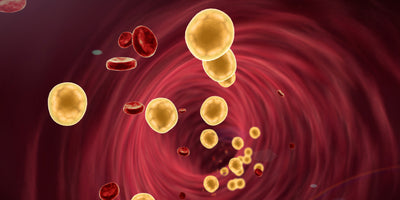
Staying Hydrated While Intermittent Fasting with Hydrate Supplements
Introduction to Hydration and Intermittent Fasting
Intermittent fasting stands out as a transformative approach to eating, not just for weight management but for fostering overall health improvements. This dietary strategy, which cycles between defined periods of eating and fasting, has garnered acclaim for its potential to enhance metabolic health, aid in weight loss, and possibly extend lifespan. However, the essence of a successful fasting experience isn't solely in the timing of meals but also in how we maintain hydration. Water is vital for life, playing a pivotal role in numerous bodily functions, including temperature regulation, joint lubrication, and toxin elimination. During fasting, the body's need for hydration becomes even more pronounced, given the absence of food intake, which can also contribute to fluid intake through its water content.
Adding another layer to this hydration challenge is the fact that not all beverages are considered equal in the realm of intermittent fasting. While water is paramount, hydrate supplements — specially formulated solutions enriched with electrolytes and minerals — emerge as invaluable allies. These supplements are designed to replenish the body's essential nutrients lost during the fasting window, supporting hydration at a cellular level. This article aims to unravel the synergy between intermittent fasting and optimal hydration practices, focusing particularly on the strategic use of hydrate supplements. Through a detailed exploration of how these supplements work, when to incorporate them into your fasting plan, and tips for staying effectively hydrated, we invite readers on a journey to enhance their intermittent fasting regimen for maximum health benefits.
The Crucial Role of Hydration in Intermittent Fasting
Understanding the Body's Hydration Needs: Water is not just a basic necessity; it's the foundation of our health and well-being. It facilitates critical bodily functions, including digestion, nutrient absorption, and the elimination of waste products. When embarking on intermittent fasting, the body's routine processes continue, but without the added hydration that comes from food, making it imperative to consciously increase fluid intake. Dehydration can quickly derail the benefits of fasting, leading to fatigue, headaches, and decreased cognitive function, which contradicts the fasting goals of improved health and vitality.
Hydration's Impact on Fasting Efficacy: Proper hydration is not only about warding off the negative side effects of dehydration but also about enhancing the fasting experience. Adequate water intake has been shown to support metabolic processes, including lipolysis, the breakdown of fats for energy, which is often a primary goal of intermittent fasting. Furthermore, staying hydrated can help manage hunger pangs and cravings that are common during fasting periods, making it easier to stick to your fasting schedule without succumbing to the temptation to break it prematurely.
Navigating the World of Hydrate Supplements
Defining Hydrate Supplements: In the context of intermittent fasting, hydrate supplements are more than just a trendy fitness accessory; they are a strategic tool for maintaining optimal hydration levels. These supplements typically contain a blend of electrolytes (such as sodium, potassium, magnesium, and calcium) that the body loses through sweat and natural metabolic processes. They may also include vitamins and minerals to support overall wellness. Unlike regular sports drinks, high-quality hydrate supplements are often low in calories and sugars, making them ideal for fasting periods without breaking the fast.
Benefits of Hydrate Supplements During Fasting: The targeted use of hydrate supplements can significantly enhance the fasting experience. They quickly replenish lost electrolytes, improving hydration efficiency and preventing the common side effects of dehydration, such as dizziness, muscle cramps, and fatigue. Moreover, electrolyte balance is crucial for nerve and muscle function, ensuring that you can maintain your physical and cognitive activities without interruption. For those practicing intermittent fasting, hydrate supplements provide a convenient and effective way to support their hydration needs, especially during longer fasting windows or in hot climates where sweating increases mineral loss.
Choosing the Right Hydrate Supplements for Your Fasting Plan
Criteria for Selection: Selecting the ideal hydrate supplement requires a nuanced understanding of your body's needs and your fasting goals. It's vital to look for products that offer a balanced spectrum of electrolytes without unnecessary additives, sugars, or calories that could interrupt your fast. Supplements should also be tailored to your activity level; for instance, individuals engaging in high-intensity workouts might need a higher concentration of electrolytes to compensate for increased sweat loss. Moreover, consider the form of the supplement — whether it's a powder, tablet, or liquid — and choose one that aligns with your preferences for ease of consumption and portability.
Personal Health Considerations: Your health status plays a critical role in supplement selection. For those with medical conditions such as hypertension or kidney issues, consulting with a healthcare provider is crucial to ensure the supplement's electrolyte content does not exacerbate existing health problems. Additionally, understanding any potential interactions between hydrate supplements and medications you're taking is essential for your safety and well-being.
Optimal Timing and Dosage for Hydrate Supplements
Timing is Key: Integrating hydrate supplements into your intermittent fasting regimen isn't just about what you take; it's also about when you take it. The optimal time is during your eating window, which allows your body to absorb the nutrients effectively without breaking your fast. However, if your fasting plan permits zero-calorie intake during fasting periods, taking electrolyte supplements that don't contain sugars or calories can be considered safe and won't technically break your fast. This approach ensures that you stay hydrated and electrolyte-balanced throughout the day, especially important for longer fasting windows or physically demanding days.
Understanding Dosage: The appropriate dosage of hydrate supplements varies based on several factors, including individual hydration needs, environmental conditions, and activity levels. Most products come with recommended dosages, but it's important to start with the lower end of the spectrum to assess how your body responds. Overconsumption of electrolytes can lead to imbalances just as detrimental as deficiencies, so monitoring your body's signals and adjusting intake accordingly is crucial.
DIY Hydration Solutions and Their Benefits
Creating Your Own Hydration Mixes: For those who prefer a more natural or cost-effective approach to hydration, DIY hydration solutions can be a valuable alternative to commercial supplements. Simple recipes often involve a mix of natural fruit juices (for flavour and natural sugars), water, and a pinch of salt (for sodium and chloride) — ingredients easily found in most kitchens. These homemade concoctions can help maintain electrolyte balance and hydration without the added costs or artificial ingredients found in some store-bought options.
Advantages and Considerations: The primary advantage of DIY hydration solutions is the control over ingredients, allowing you to adjust the taste and electrolyte content to your personal preference and dietary needs. Additionally, using natural ingredients can offer other health benefits, including vitamins and antioxidants from fruit juices. However, it's important to recognise that homemade solutions might not always provide the precise electrolyte balance needed for intense physical activity or extreme conditions. Therefore, they should be seen as part of a broader hydration strategy, especially for those new to intermittent fasting or with specific health considerations.
Common Hydration Mistakes to Avoid During Intermittent Fasting

Overlooking Early Signs of Dehydration: One of the most frequent mistakes is ignoring the subtle signs of dehydration, such as slight headaches, fatigue, or decreased urine output. During fasting, it’s easy to attribute these symptoms to hunger or the fasting process itself. Recognising and addressing these early signs by increasing your fluid intake can prevent more severe dehydration symptoms.
Relying Solely on Thirst: Waiting to feel thirsty before drinking water can lead to unintentional dehydration. Thirst is a late indicator of the body's hydration needs, especially for older adults or those with certain medical conditions who might have a diminished thirst response. Consistently sipping on water and hydrate supplements throughout the day, regardless of thirst, ensures steady hydration.
Neglecting Electrolyte Balance: Focusing solely on water intake without considering electrolytes can disrupt the body's balance, potentially leading to hyponatremia (low blood sodium levels) in extreme cases. Incorporating a balanced intake of electrolytes through foods or supplements during your eating windows supports overall fluid balance and prevents electrolyte imbalances.
Underestimating the Impact of Environment and Activity: Environmental factors like heat and humidity increase sweat production, as does physical activity, elevating the need for both water and electrolytes. Adjusting your hydration strategy to account for these factors is crucial for maintaining hydration and supporting your fasting and fitness goals.
Tailoring Your Hydration Strategy to Your Fasting Schedule
For 16/8 Fasting (Daily Eating Window): In this popular fasting method, where you fast for 16 hours and eat during an 8-hour window, timing your hydrate supplement intake for the beginning and end of your eating window can help maintain hydration levels throughout the fasting period. Drinking water consistently outside of these times keeps you hydrated without breaking your fast.
For 5:2 Fasting (Two Non-Consecutive Fasting Days a Week): On fasting days, where calorie intake is significantly reduced, focusing on hydration becomes even more critical. Opt for hydrate supplements that are low in calories but rich in electrolytes to support your body’s needs without compromising the fasting state. Ensure you’re well-hydrated on eating days to prepare your body for the upcoming fast.
For Alternate-Day Fasting: This approach demands a more dynamic hydration strategy due to the alternating nature of fasting days. On fasting days, prioritise electrolyte intake through zero-calorie supplements to maintain energy levels and hydration. Eating days should focus on hydrating foods and balanced electrolyte supplementation to replenish and prepare for the next fast.
Listening to Your Body: Beyond following these guidelines, the most crucial advice is to listen to your body. Hydration needs can vary significantly from person to person based on factors like weight, age, activity level, and individual health conditions. Tailoring your hydration approach to your unique needs and adjusting based on how you feel can optimise your intermittent fasting experience.
Summary
Hydration's Role in Intermittent Fasting:
- Maintaining hydration is crucial for optimising the health benefits of intermittent fasting.
- Water is essential, but hydrate supplements can provide an added boost of electrolytes and minerals.
- Hydrate supplements contain electrolytes like sodium, potassium, and magnesium, supporting hydration and nutrient balance.
- Choose supplements with a balanced spectrum of electrolytes, low in sugars and calories, suited to your fasting plan and health goals.
- Consume hydrate supplements during your eating window to avoid breaking your fast.
- Dosage should be based on individual needs, activity level, and environmental factors.
- Homemade hydration mixes can be a natural and cost-effective alternative to store-bought supplements.
- Balance is key, ensuring DIY solutions contain essential electrolytes and are tailored to taste preferences and dietary needs.
- Ignoring early signs of dehydration and relying solely on thirst as an indicator can lead to underhydration.
- It's important to balance water intake with electrolyte consumption to prevent imbalances.
- Hydration strategies should be adjusted based on the type of intermittent fasting practiced, such as 16/8, 5:2, or alternate-day fasting.
- Environmental conditions and physical activity levels also influence hydration needs.
- Individual hydration needs vary; listening to your body and adjusting hydration strategies accordingly is crucial for maintaining balance and supporting fasting goals.









